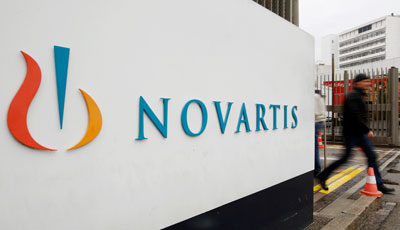Novartis receives EU approval for Jakavi ®, the first targeted therapy approved for patients with the rare blood cancer polycythemia vera
Posted: 18 March 2015 |
Novartis announce that the EU has approved Jakavi ® for the treatment of adult patients with polycythemia vera (PV)…


Novartis have announced that the European Commission has approved Jakavi® (ruxolitinib) for the treatment of adult patients with polycythemia vera (PV) who are resistant to or intolerant of hydroxyurea. PV is a rare blood cancer associated with an overproduction of blood cells that can lead to serious cardiovascular complications if left untreated1. Jakavi is the first targeted treatment approved by the European Commission for patients with PV2.


PV is a incurable blood cancer associated with an overproduction of blood cells that can cause serious cardiovascular complications, such as blood clots, stroke and heart attack1. Approximately 25% of patients with PV develop resistance to or intolerance of hydroxyurea and are considered to have uncontrolled disease3. This is typically defined as hematocrit levels greater than 45%, elevated white blood cell count and/or platelet count, and may be accompanied by debilitating symptoms and/or an enlarged spleen3,4,5.
“The European Commission’s approval of Jakavi is encouraging news for patients,” said Dr. Claire Harrison, study investigator and Consultant Hematologist, Guy’s and St. Thomas’ NHS Foundation Trust, London. “Jakavi will fill an unmet need as the first treatment shown to significantly improve hematocrit, as well as symptom control and reduce spleen size in patients with polycythemia vera resistant to or intolerant of hydroxyurea.”
The approval is based on data from the pivotal Phase III RESPONSE clinical trial demonstrating that a significantly greater proportion of patients achieved the composite primary endpoint of hematocrit control without use of phlebotomy and spleen size reduction, key measures of disease control, when treated with Jakavi compared to best available therapy (21% compared to 1%, respectively; p<0.0001)1,2. In the study, a 50% or more improvement in PV-related symptoms was seen in 49% of Jakavi-treated patients compared to 5% of patients treated with best available therapy2.
Jakavi® brings physicians a new way to treat PV
“The approval of Jakavi in polycythemia vera underscores what’s possible in today’s era of precision oncology research,” said Bruno Strigini, President, Novartis Oncology. “Jakavi specifically targets the JAK-STAT pathway, which regulates blood cell production and is known to play a key role in the underlying mechanism of this disease, bringing patients and physicians a new way to treat polycythemia vera.”
Overall, non-hematologic adverse events (AEs) were consistent with those previously seen in other Jakavi studies in PV and myelofibrosis2,6,7. Within the first 32 weeks of treatment, the most common Grade 3 or 4 hematologic AEs in the Jakavi-treatment arm were anemia (1.8%) and thrombocytopenia (5.5%)2. The most common non-hematologic AEs were dizziness (15.5%), constipation (8.2%) and herpes zoster (6.4%)2. The three most frequent non-hematological laboratory abnormalities (any Grade) were hypercholesterolemia (30.0%), raised alanine aminotransferase (22.7%) and raised aspartate aminotransferase (20.9%), which were mainly Grade 1 and 22.
The European Commission approval applies to all 28 EU member states, plus Iceland, Norway and Liechtenstein. Additional regulatory applications for ruxolitinib in PV are currently ongoing in countries worldwide, and further regulatory filings are under review by health authorities. Ruxolitinib, which is marketed in the US by Incyte Corporation as Jakafi®, received approval in December 2014 from the US Food and Drug Administration (FDA) for the treatment of patients with PV who have had an inadequate response to or are intolerant of hydroxyurea.
Novartis provides innovative healthcare solutions that address the evolving needs of patients and societies. To find out more, visit http://www.novartis.com.
For information about Jakavi®, please visit http://www.jakavi.com.
References
- Leukemia & Lymphoma Society. “Polycythemia Vera Facts.” Available at: http://www.lls.org. Accessed on April 28, 2014.
- Jakavi® (ruxolitinib) tablets: EU Summary of Product Characteristics. Novartis; Jan 2015.
- Alvarez-Larran A, Pereira A, Cervantes F, et al. Assessment and Prognostic Value of The European Leukemianet Criteria for Clinicohematologic Response, Resistance, and Intolerance to Hydroxyurea in Polycythemia Vera. Blood. 2012;119(6):1363-1369.
- Barbui T, Barosi G, Birgegard G, et al. Philadelphia-Negative Classical Myeloproliferative Neoplasms; Critical Concepts and Management Recommendations from European LeukemiaNET. J Clin Oncol. 2011;29(6):761-770.
- Emanuel R, Dueck A, Geyer H, et al. Myeloproliferative Neoplasm (MPN) Symptom Assessment Form Total Symptom Score: Prospective International Assessment of an Abbreviated Symptom Burden Scoring System Among Patients with MPNs. J Clin Oncol.2012;30(33):4098-4103.
- Cervantes F, Vannucchi AM, Kiladjian JJ, et al. Three-Year Efficacy, Safety, and Survival Findings From Comfort-II, A Phase 3 Study Comparing Ruxolitinib with Best Available Therapy for Myelofibrosis. Blood. 2013, 122(25):4047-4053.
- Verstovsek S, Ruben M, Gotlib J, et al. Long-Term Outcome of Ruxolitinib Therapy in Patients with Myelofibrosis: 3-Year Update from COMFORT-I. Abstract #396. 55th American Society of Hematology (ASH) Annual Meeting and Exposition, 2013. New Orleans, LA.




